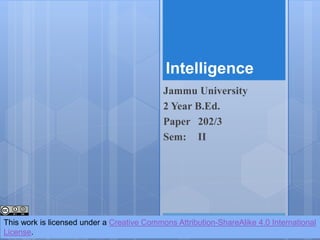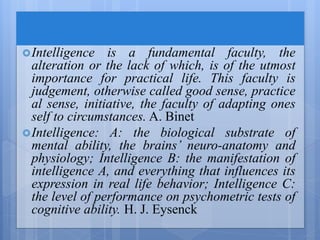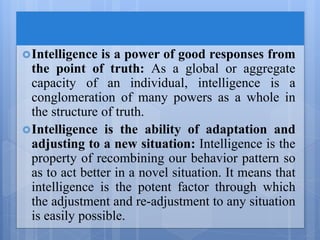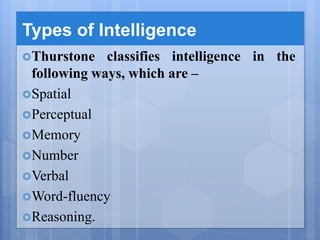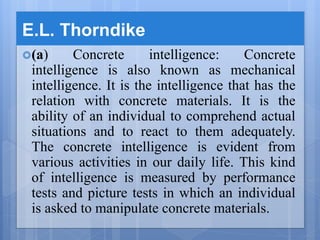Intelligence meaning and types
- 1. Intelligence Jammu University 2 Year B.Ed. Paper 202/3 Sem: II This work is licensed under a Creative Commons Attribution-ShareAlike 4.0 International License.
- 2. Intelligence is not a single, unitary ability, but rather a composite of several functions. The term denotes that combination of abilities required for survival and advancement within a particular culture. -Anastasi Intelligence is that facet of mind underlying our capacity to think, to solve novel problems, to reason and to have knowledge of the world. M. Anderson
- 3. Intelligence is a fundamental faculty, the alteration or the lack of which, is of the utmost importance for practical life. This faculty is judgement, otherwise called good sense, practice al sense, initiative, the faculty of adapting ones self to circumstances. A. Binet Intelligence: A: the biological substrate of mental ability, the brains’ neuro-anatomy and physiology; Intelligence B: the manifestation of intelligence A, and everything that influences its expression in real life behavior; Intelligence C: the level of performance on psychometric tests of cognitive ability. H. J. Eysenck
- 4. Intelligence is the ability to solve problems, or to create products, that are valued within one or more cultural settings. H. Gardner Intelligence is performing an operation on a specific type of content to produce a particular product. J. P. Guilford
- 5. Characteristics of Intelligence Intelligence is the power or capacity of human being: Intelligence is the power or capacity of human being which helps to make reason, understanding and well-judgment. Intelligence is the capacity which is innate as well as acquired. Intelligence means all-round mental efficiency: All round mental efficiency means that it includes all the qualities in mental development of an individual. Through the process of intelligence the whole general and abstract thinking, reasoning powers are revealed.
- 6. Intelligence is a power of good responses from the point of truth: As a global or aggregate capacity of an individual, intelligence is a conglomeration of many powers as a whole in the structure of truth. Intelligence is the ability of adaptation and adjusting to a new situation: Intelligence is the property of recombining our behavior pattern so as to act better in a novel situation. It means that intelligence is the potent factor through which the adjustment and re-adjustment to any situation is easily possible.
- 7. Intelligence is the ability for abstract thinking as well as the capacity to learn from the past experience: Intelligence is the ability to think abstractly. It is also the capacity to learn from the past experience and hence, it makes the profitable use of the past. Intelligence is not knowledge though acquisition of knowledge depends to a great extent on intelligence and vice-versa. Intelligence is not acquired after sustained labour. It is a gift from nature.
- 8. Intelligence is not memory. An intelligent person may have poor memory. Intelligence is not a skill which a worker acquires after planned practice. Intelligence is not a guarantee of a good behaviour of the individual.
- 9. Classification intelligence as given by E.L. Thorndike 1. Concrete Intelligence – It is the ability of an individual to comprehend actual situations and to react to them adequately. The concrete intelligence is evident from various activities of daily life. This type of intelligence is applicable when the individual is handling concrete objects or medicines. Engineers, mechanics and architects have this type of intelligence.
- 10. 2. Abstract Intelligence – It is the ability to respond to words, numbers and symbols. Abstract intelligence is required in the ordinary academic subjects in the school. This is acquired after an intensive study of books and literature. Good teachers, lawyers, doctors, philosophers etc. have this type of intelligence.
- 11. 3. Social Intelligence – It means the ability of an individual to react to social situations of daily life. Adequate adjustment in social situations is the index of social intelligence. Persons having this type of intelligence know the art of winning friends and influencing them. Leaders, ministers, members of diplomatic sources and social workers have it.
- 12. Characteristics of Intelligence: Intelligence is an innate natural endowment of the child. It helps the child in maximum learning in minimum period of time. The child is able to foresee the future and plan accordingly. The child is able to take advantage of his previous experiences. The child faces the future with compliance.
- 13. He develops a sense of discrimination between right or wrong. The developmental period of intelligence is from birth to adolescence. There is a minor difference in the development of intelligence between boys and girls. There are individual differences with regard to the intelligence between boys and girls. Intelligence is mostly determined by heredity but a suitable environment necessary to improve it.
- 14. Intelligence is the ability for adjustment to environment, ability to perceive relationship between various objects and methods, ability to solve problems, ability to think independently, ability to learn maximum in minimum period of time, ability to benefit from one’s own experience and the experience of others. Intelligence is an inborn ability of an individual, the distribution of intelligence is not equal among all human beings. There is wide individual difference that exists among individuals with regard to intelligence.
- 15. Types of Intelligence Thurstone classifies intelligence in the following ways, which are – Spatial Perceptual Memory Number Verbal Word-fluency Reasoning.
- 16. E.L. Thorndike (a) Concrete intelligence: Concrete intelligence is also known as mechanical intelligence. It is the intelligence that has the relation with concrete materials. It is the ability of an individual to comprehend actual situations and to react to them adequately. The concrete intelligence is evident from various activities in our daily life. This kind of intelligence is measured by performance tests and picture tests in which an individual is asked to manipulate concrete materials.
- 17. (b) Abstract intelligence: Abstract intelligence indicates the ability to respond to words, numbers, formulas, diagram and letters etc. This formula is conspicuously absent in animals. An abstractly intelligent person is able to discover relations among symbols and to solve the various problems with the help of such aids (symbols, formula, diagram, letter etc.)
- 18. (c) Social intelligence: Social intelligence means the ability of an individual to react to social situations of his or her daily life. Social intelligence is possessed by those people who are able to handle people well and also have the ability to make friends easily and understand human relations. Adequate adjustment in social situations is the index of social intelligence.
- 19. The Nine Types of Intelligence: Howard Gardner 1. Naturalist Intelligence 2. Musical Intelligence (“Musical Smart”) 3. Logical-Mathematical Intelligence (Number/Reasoning Smart) 4. Existential Intelligence 5. Interpersonal Intelligence (People Smart”) 6. Bodily-Kinesthetic Intelligence (“Body Smart”) 7. Linguistic Intelligence (Word Smart) 8. Intra-personal Intelligence (Self Smart”) 9. Spatial Intelligence (“Picture Smart”)

